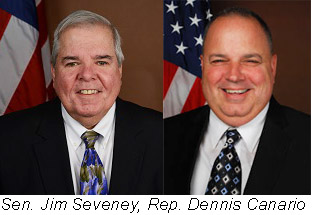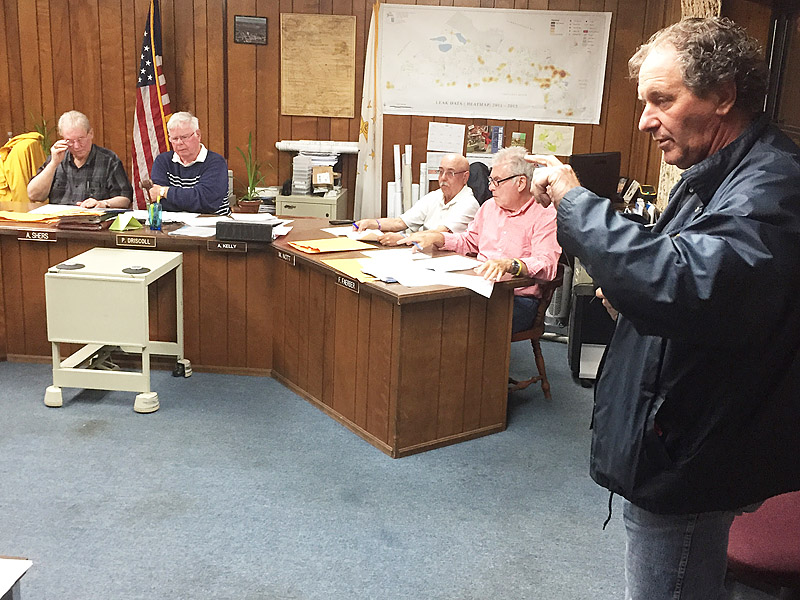 With final approval in both chambers today, the General Assembly approved two bills to prevent gun violence and mass shootings: a ban on bump stocks and other rapid-fire gun modifications and “red flag” legislation that allows courts to disarm individuals who are believed by law enforcement to represent a violent threat to themselves or others.
With final approval in both chambers today, the General Assembly approved two bills to prevent gun violence and mass shootings: a ban on bump stocks and other rapid-fire gun modifications and “red flag” legislation that allows courts to disarm individuals who are believed by law enforcement to represent a violent threat to themselves or others.
Both bills were sponsored by Portsmouth legislators, and will now go to Gov. Gina Raimondo, who has planned to sign them in a ceremony tomorrow, Friday, June 1, at 11:30 a.m. on the south steps of the State House.
The first bill, sponsored in the Senate by Senate Majority Whip Maryellen Goodwin and in the House by Rep. Dennis Canario, is known as a “red flag” law because it allows police to seek from Superior Court an “extreme risk protective order” that prohibits an individual from possessing firearms, based on threats and other warning signs that the person might commit violence.
“This legislation is a way to stop tragedies before they happen. Of course someone who has guns and is making serious threats to harm people with them should not be armed. Too often, after a mass shooting we learn about all the warning signs people saw from the shooter and wonder why they still had guns. But the truth is, there isn’t always a legal means to stop them. Our legislation provides a speedy but fair process to ensure that those who pose a legitimate risk do not remain armed,” said Sen. Goodwin (D-1).
Said Rep. Canario (D-71), “As a retired police officer with more than 25 years of experience in the law enforcement field, recent tragic events have placed into focus the extreme dangers of having firearms in the hands of troubled individuals. I thank my fellow officers for their leadership and commitment to this public policy issue. This legislation seeks to take guns away from individuals with behavioral health problems so that our children and the public will remain safe.”
Under the bill (2018-S 2492A, 2018-H 7688Aaa), an extreme risk protective order would prohibit an individual from possessing or purchasing guns, would require them to surrender guns in their possession and would invalidate any concealed carry permits they have. The order would be reported to the National Instant Criminal Background Check System (NICS) and all state and federal lists used for determining whether those seeking to purchase guns have been prohibited from doing so. Violating such an order would be a felony punishable by up to 10 years in prison.
The order would be in place for one year, but could be renewed by the court. Those subject to one could also petition once per year to have them lifted.
Under the bill, a law enforcement agency could petition Superior Court for an extreme risk protection order if it believes the individual poses a significant danger of causing imminent injury to himself or others by having a firearm. The petitioner must state to the court the specific statements, actions, or facts that give rise to a reasonable fear of future dangerous acts by that individual, and must concurrently file for a search warrant to search for any weapons the individual possesses.
Upon the filing for an order, the court may issue temporary extreme risk protective order, similar to a temporary restraining order, if the court finds probable cause to believe the individual poses an imminent threat to others or himself if armed.
A judge would determine at a hearing whether to issue an extreme risk protection order, considering any recent acts or threats of violence with or without a firearm and patterns of such threats or acts in the previous year, and the individual’s mental health, substance abuse and criminal histories. The court would also consider any unlawful, threatening, or reckless use or brandishing of a firearm by the individual and evidence of any recent acquisition of a firearm.
Such legislation could have helped to prevent the Parkland, Fla., school shooting Feb. 14. Police say the alleged shooter carried out the attack with a legally purchased semi-automatic weapon. Before the shooting, his mother had contacted law enforcement about his behavior on multiple occasions, but Florida did not have a red flag law. It has since passed one.
According to Everytown for Gun Safety, a national advocacy group that supports the bill, a nationwide study of mass shootings from 2009 to 2016 showed that in least 42 percent of those incidents, there is documentation that the attacker exhibited dangerous warning signs before the shooting.
Connecticut, California, Indiana, Oregon and Washington enacted red flag laws prior to this year, and since the Parkland shooting, so have Florida, Maryland and Vermont.
The other bill (2018-H 7075Aaa, 2018-S 2292A), sponsored by Rep. Robert E. Craven and Sen. James A. Seveney, would ban bump stocks, binary triggers and trigger cranks on semi-automatic weapons.
A bump stock is an attachment that allows the shooter to fire a semi-automatic weapon with great rapidity. It replaces a rifle’s standard stock, freeing the weapon to slide back and forth rapidly, harnessing the energy from the kickback shooters feel when the weapon fires.
In October’s mass shooting in Las Vegas, 12 of the rifles in the gunman’s possession were modified with a bump stock, allowing the weapon to fire about 90 shots in 10 seconds — a much faster rate than the AR-15 style assault rifle used by the Orlando nightclub shooter, which fired about 24 shots in nine seconds.
“With the tragic and horrific event in Las Vegas demonstrating the powerful lethality that bump stocks can facilitate, we must make the law clear that Rhode Island will not tolerate these dangerous tools of death. Currently there is some ambiguity to whether or not applying a bump stock to one’s weapon is legal in Rhode Island, but it is still legal to purchase one. This bill will end that practice, making the sale and possession of bump stocks, even if they are not affixed to a weapon, illegal and punishable by the full extent of the law,” said Rep. Craven (D-32).
Said Sen. Seveney, (D-11), “While federal law bans fully automatic weapons manufactured after May 19, 1986, the bump stock and other modifying devices do not technically make the weapon a fully automatic firearm, even though it allows a weapon to fire at nearly the rate of a machine gun. This law would effectively ban these horrific devices in Rhode Island.”
The bill would make it unlawful to possess, transport, manufacture, ship or sell a bump stock, regardless of whether the person is in possession of a firearm. Those violating the provisions, would face imprisonment for up to 10 years, a fine up to $10,000, or both. It would also make it unlawful and apply the same penalties for any person to modify any semi-automatic weapon to shoot full automatic fire with a single pull or hold of the trigger.
The legislation would also ban binary triggers, which is a device designed to fire one round on the pull of the trigger and another round upon release of the trigger, effectively doubling the weapon’s shooting capabilities; and trigger cranks, which attach to the trigger of a semi-automatic weapon and cause the weapon to fire by turning the crank handle.
Both bills have the support of Governor Raimondo, Attorney General Peter Kilmartin, General Treasurer Seth Magaziner, the State Police, the Rhode Island Coalition Against Gun Violence, the Rhode Island chapter of Moms Demand Action for Gun Sense in America (a part of Everytown) and the Rhode Island Coalition Against Domestic Violence.
“I applaud the General Assembly for taking an important step to enhance our gun safety laws public safety by establishing a legal process to keep firearms out of the hands of those who are a danger to themselves or others,” said AG Kilmartin. “While there is no one answer to ending the epidemic of gun violence in our country, I believe measured approaches such as the red flag law and banning bump stocks will improve public safety while also protecting the rights of legal gun owners.”
Editorial note: Written from a State House news release.
 By Rep. Lauren H. Carson
By Rep. Lauren H. Carson On Wednesday, June 13, 2018, registered voters residing in the Portsmouth Water and Fire District will elect two (2) Tax Assessors and one (1) Tax Collector for a three year term to the seven member Administrative Board. The polls will be open from 7:00 AM to 8:00 PM at the District's office at 1944 East Main Road.
On Wednesday, June 13, 2018, registered voters residing in the Portsmouth Water and Fire District will elect two (2) Tax Assessors and one (1) Tax Collector for a three year term to the seven member Administrative Board. The polls will be open from 7:00 AM to 8:00 PM at the District's office at 1944 East Main Road. With final approval in both chambers today, the General Assembly approved two bills to prevent gun violence and mass shootings: a ban on bump stocks and other rapid-fire gun modifications and “red flag” legislation that allows courts to disarm individuals who are believed by law enforcement to represent a violent threat to themselves or others.
With final approval in both chambers today, the General Assembly approved two bills to prevent gun violence and mass shootings: a ban on bump stocks and other rapid-fire gun modifications and “red flag” legislation that allows courts to disarm individuals who are believed by law enforcement to represent a violent threat to themselves or others. Fifty years ago, Tom Stoppard dug up two minor characters from Hamlet and gave them a full-length spotlight. His play, Rosencrantz and Guildenstern Are Dead, is a masterpiece, and the Contemporary Theater Company has mounted a brilliant, agile production that matches the linguistic sparkle of Stoppard — and Shakespeare. Do yourself a favor, and go see it this weekend.
Fifty years ago, Tom Stoppard dug up two minor characters from Hamlet and gave them a full-length spotlight. His play, Rosencrantz and Guildenstern Are Dead, is a masterpiece, and the Contemporary Theater Company has mounted a brilliant, agile production that matches the linguistic sparkle of Stoppard — and Shakespeare. Do yourself a favor, and go see it this weekend. The Portsmouth Water and Fire District will hold its annual election of officers on Wednesday, June 13, 2018 at the District's main office at 1944 East Main Road. The polls will open at 7:00 AM and close at 8:00 PM.
The Portsmouth Water and Fire District will hold its annual election of officers on Wednesday, June 13, 2018 at the District's main office at 1944 East Main Road. The polls will open at 7:00 AM and close at 8:00 PM.